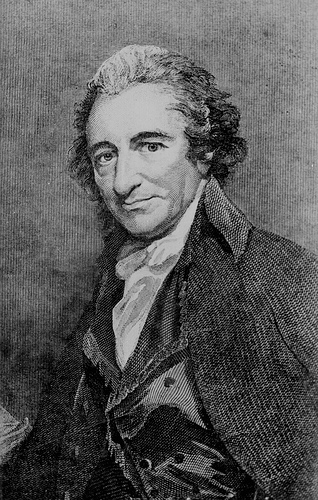Moonstone Inc. & The Historical Society of Pennsylvania Present
Thomas Paine: Apostle of Freedom
A Presentation by Jack Fruchtman
Wednesday February 4, 2009, 6pm
Historical Society of Pennsylvania
1300 Locust Street
Join us for the first of four presentations on Thomas Paine in celebration of the 200th anniversary of his death on June 8, 2009. In addition to the four presentations there will be a panel discussion on Paine’s influence and importance in American History and an essay contest in the Philadelphia public high schools. Please check our website www.forgottenfoundingfather.net
Thomas Paine turned a tax revolt into a revolution for independence with Common Sense, saved the revolution from failure with The Crisis, defended the French Revolution, attacked the political bureaucracy, and promoted the concepts of democracy in The Rights of Man, attacked the religious bureaucracy and promoted Deism in The Age of Reason, and confronted the issues of poverty in Agrarian Reform.
Jack Fruchtman, Jr. is professor political science at Maryland’s Towson State University. His is the author of The Apocalyptic Politics of Richard Price and Joseph Priestley, Thomas Paine and the Religion of Nature, Thomas Paine: Apostle of Freedom, Atlantic Cousins: Benjamin Franklin and His Visionary Friends and the forthcoming The Political Science of Thomas Paine.
This program is made possible by a grant from the Pennsylvania Humanities Council with additional support from the Samuel S. Fels Fund, the Barra Foundation, and the Pennsylvania Council on the Arts.

“With new insights into Paine’s life comes new understanding of his writings, those seeds of our revolution. One can’t read this long-overdue, revealing, and moving biography without feeling both the admiration and the same frustrations Fruchtman did, coming away angered that ‘the problems …tragically remain today.’ The role of the true revolutionary is exposed, and Fruchtman’s study succeeds better than most in giving us deeper understanding of that lonesome role and its purpose. We haven’t yet come even half way as a society to meet Paine’s vision. In the whole work, and especially in his last chapter, “Assessment,” Fruchtman comes very near to that indistinct line between biographer and champion. His solid work corrects earlier lies about Paine, and if he slips into exhortation, it is only because no one could know Paine so well and not be so affected. Paine’s spirit lives, restrained only by scholarly discipline, making for a highly readable, highly recommended work.” – John Berry, Library Journal
